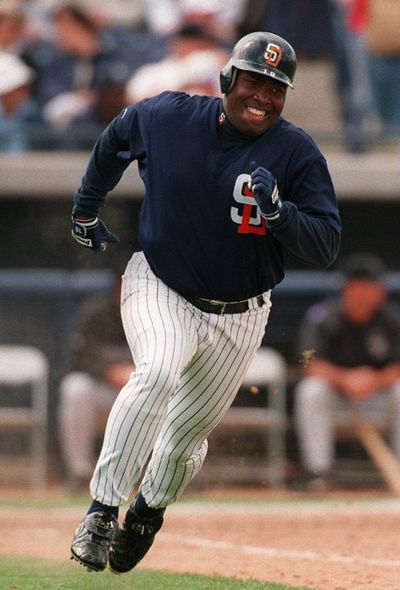After Gwynn’s death, area coaches to warn players about smokeless tobacco

Baseball legend Tony Gwynn turned hitting into an art form. His engaging smile and high-pitched voice made him an approachable sports legend young players wanted to emulate.
Gwynn died Monday from cancer in his cheek that he previously blamed on decades of chewing smokeless tobacco. His death at 54 has shifted talk of his sweet, effortless swing to the lingering image of a sport perpetually stained by smokeless tobacco use.
Gwynn had direct and indirect dealings with three area high school coaches who now will use Gwynn’s death as a reminder of how an image can kill.
“When you are playing in the minor leagues, they kind of just suck you in,” said Rogers High School baseball coach Jim Wasem, who trained with Gwynn and the San Diego Padres in the 1980s. “They had (smokeless tobacco) on trays, whatever you wanted. You got a whole case of it. If you were a dipper, they gave you a sleeve of cans.
“As soon as you started doing it, it’s pretty addictive,” said Wasem, who finally was able to quit chewing after 17 years.
But baseball officials tightened the reins and in 1993 banned smokeless tobacco use in the minor leagues. Gonzaga Prep coach Brian Munhall said that ban was in place when he played in the minor leagues from 2002 to 2009.
Near the end of his career while in the Brewers organization, Munhall caught Tony Gwynn’s son, Tony Jr.
“They used to have basically the chew police,” Munhall said. “They would sit in the stands with binoculars. If they caught you dipping, it would be a $500 fine for you and a $500 fine for your manager.
“That means it would be a $1,000 fine for you and you were probably making $2,000 a month.”
Despite the danger, half of Munhall’s teammates continued to chew.
“Somehow, it’s been something that has been tied to baseball,” he said.
All three coaches said their schools have a zero-tolerance with area students. But they can’t control what those players do once they leave practice.
Even Little League games are infused with the image of chewing. Munhall said one of the most popular brands of gum is “Big League Chew” and concession stands sell shredded beef jerky in cans made to look just like those that carry smokeless tobacco.
“It’s pretty smart marketing … to get them started at a young age and hopefully they will become their new lifetime customers,” Munhall said.
Mr. Padre
Gwynn had a .338 batting average over two decades and batted .300 or better for 19 consecutive seasons, a National League record.
Wasem joked that Gwynn could play one more year and strike out at every at-bat and still finish with a career batting average over .300.
When he played as a minor leaguer with the Padres, Wasem said the team would bus the players to the spring training facility in Yuma, Arizona.
Gwynn “had his own car. He’d be there an hour before anybody else in the batting cage. He’d be there batting by himself,” Wasem said. “He was kind of an infectious guy. He always had a crowd around him listening to him. We were just minor league pups looking up to him.”
The master didn’t hand down the secret of his sweet stroke, but he did give Wasem one of his signature 32-inch bats.
Wasem was using that bat in a game when he hit a ball wrong and it caused some of the wood to flake off the end. Between at-bats, the batboy picked up the bat and mistakenly thought it was broken.
“My next time up, I go to get the bat and it’s gone,” Wasem said. “I asked, ‘What did you do with my bat?’ He said he thought it was broken so he just gave it to a fan. I said, ‘Hey, that was Tony Gwynn’s.’ ”
The batboy pointed out the young fan who received the prized bat, but Wasem didn’t make an effort to retrieve it.
“I didn’t want to be that kind of guy,” he said.
Mt. Spokane coach Alex Schuerman said he grew up a Gwynn fan and chose a similar 32-inch bat, out of respect.
“He was one of the purest hitters. He was my era as a kid. He was one of the faces of baseball,” Schuerman said. “I always modeled the size of the bat he used. Here I am a freshman in high school and I wanted to use a 32-inch bat.”
On Monday, Schuerman just happened to be in Cooperstown, New York, on the way to the Baseball Hall of Fame when news broke of Gwynn’s death. Within minutes, Schuerman and his son were standing in front of a memorial already put up for one of the sport’s greatest ambassadors.
“It’s really sad. You loved to root for that guy. You don’t want to see an icon die like that,” Schuerman said. “These are decisions that affect you long term. My (players) probably didn’t know Tony Gwynn. But hopefully, we can get the message across to them.”